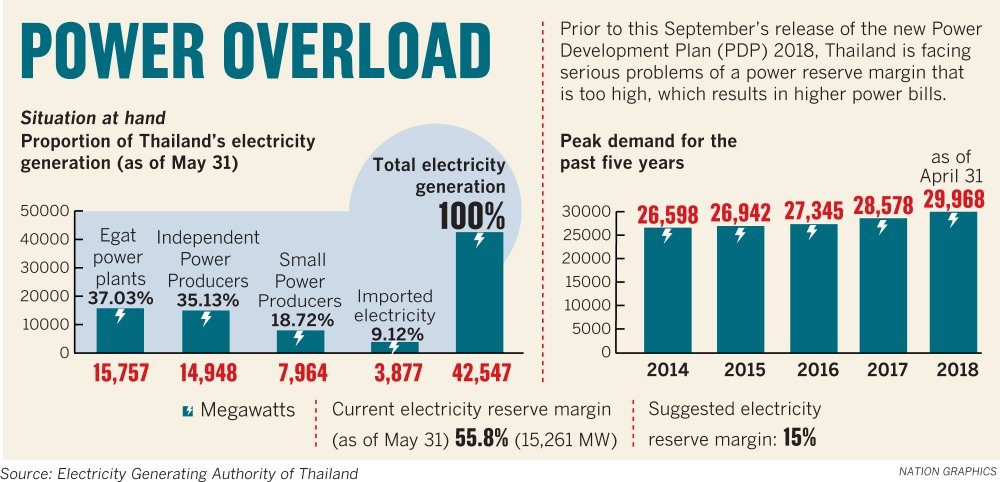EXPERTS ARE urging Thai authorities to change their mindset about power development and to be more in step with global trends by prioritising renewable energy. Adopting a new approach would solve current problems, such as the current excessive electricity reserve margin and greenhouse gas emissions from the reliance on fossil-fuel energy.
Adopting a new approach would solve current problems, such as the current excessive electricity reserve margin and greenhouse gas emissions from the reliance on fossil-fuel energy.
The country’s latest Power Development Plan (PDP) is now being drafted and should be finalised within September. Experts and some citizens have said the power reserve margin is now too high and has led to increased household and business power bills.
They object to plans to build yet more power plants despite a decreasing trend-line in power consumption and the existence of power purchase agreements with neighbouring countries .
“A too-high reserve margin is creating an unnecessary expense for the country and the people. We have to pay an ‘availability payment’ for excessive power production that we do not use, and that makes our power bills more expensive,” Supakit said.
“Based on the calculation of the availability payment made to maintain this very high reserve margin, we have over-invested up to Bt200 billion to Bt300 billion on the generation of electricity that we do not need. If we maintain the reserve margin at the appropriate level of 15 per cent, we can save a large amount of money and significantly lower people’s electricity bills.”

Instead of building even more large fossil-fuel power plants, the government should promote increased investment in small localised renewable energy power plants, said Supakit. Those small-scale solutions have been proven to be environmentally less harmful, and a series of small-scale projects can entirely replace large fossil-fuel power plants, he said.
“By switching to small renewable energy, we can better manage the power generated in the system and control the level of reserve margin than we can with large fossil-fuel power plants. That’s because small, renewable energy plants are more flexible to turn on and off to maintain a proper level of reserve margin in the electricity system,” Supakit explained.
“Therefore, I urge that the new PDP focus on renewable energy promotion, especially among the private sector, such as solar rooftops and on purchasing unlimited electricity from renewable energy based on price.”
He added that Thailand could rely solely on renewable energy for its needs. It is not true that the country requires a high reserve margin from base-load power plants to sustain renewable energy, Supakit insisted.
The new PDP will seek the cheapest sources of power, said Energy Policy and Planning Office director-general Twarath Sutabutr. The new plan will focus on cost-based electricity, choosing electricity from the cheapest sources to supply power to the system first. The Electricity Generation Authority of Thailand (Egat) will have to compete with the private power producers, he said.
“Every kind of fuel or source of power will be calculated and put into the same basket, with the cheapest source of power chosen first” in order to ensure that the cost of electricity generation will be the lowest possible, Twarath said.
Nevertheless, power stability is another major concern in the new PDP plan, he said, with Egat obliged to invest and run power plant projects to maintain the stability of power supply in each region of the country.
Twarath noted that the Energy Ministry had already acknowledged the problem of a too-high reserve margin, which stemmed from inaccurate power demand predictions in the previous PDP plan.
“We admit that there are many factors that contribute to the change in power demand of the country. For example, more advanced power saving and power generation technologies allow more power users to reduce their consumption and generate power themselves,” Twarath said.
“We are trying to solve this problem by coming out with more accurate methods to predict power demand for the new PDP plan.”




